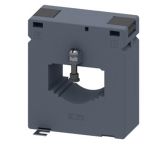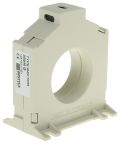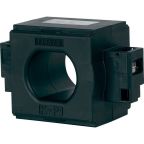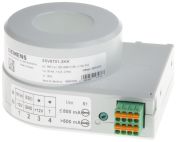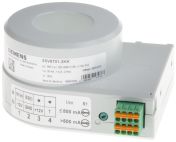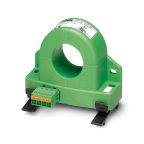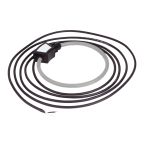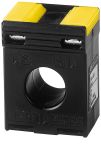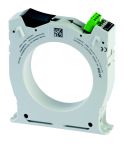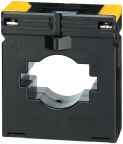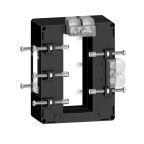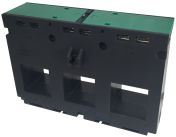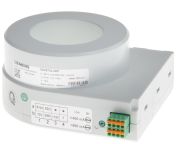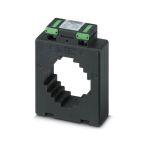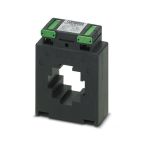Current Transformers
Current transformers (CTs), also known as Core Balance Current Transformers (CBCTs) or Current Transducers, are instruments used to safely and accurately measure high electrical currents. By converting high currents into proportionally lower, measurable currents, CTs enable precise monitoring and protection in diverse electrical systems.
RS is a leading supplier in Malaysia offering an extensive range of highly accurate Core Balance Current Transformers in various transformer types, current ratings, CT ratios, supply voltages, and mounting types to suit every application. We partner with top current transformer manufacturers like Siemens, Murata Power Solutions, LEM, and RS PRO to offer a wide selection of high-quality current transformers.
How Does a Current Transformer Work?
A current transformer operates on the principle of electromagnetic induction. When an alternating current flows through the primary winding, it generates a magnetic field. This magnetic field then induces a proportional alternating current in the secondary winding. The ratio of the primary current to the secondary current is determined by the transformer’s turns ratio. By connecting an ammeter to the secondary winding, the primary current can be safely and accurately measured without direct contact with the high-voltage circuit.
Types of Current Transformers (CT Meter)
Current transformers come in various types, each designed for specific applications and installation requirements:
1. Toroidal Current Transformers
Toroidal current transformers feature a distinctive doughnut shape and are designed without a built-in primary winding. Instead, the conductor carrying the current to be measured passes through the central opening of the transformer, acting as the primary winding. This design offers flexibility and ease of installation, making them suitable for various applications.
2. Wound Current Transformers
Wound current transformers have primary windings that are physically connected in series with the conductor carrying the measured current. The secondary winding, wound around the core, provides the output current proportional to the primary current.
3. Bar-type Current Transformers
Bar-type current transformers utilise the cable or busbar of the main circuit as its primary winding, effectively one turn of the transformer. They are typically bolted directly onto the current-carrying conductor and are fully insulated for safe operation at high voltages. These transformers are compact and easy to install, making them ideal for applications where space is limited.
4. Window Current Transformers
Window current transformers have an opening (or "window") through which the primary conductor passes. The conductor itself acts as the primary winding, while the secondary winding is wrapped around the core. Window CTs are commonly used in various industrial applications due to their cost-effectiveness, easy installation, and ability to handle greater thermal overcurrents compared to other types.
5. DIN Rail Current Transformers
DIN rail current transformers are compact devices that integrate a voltage tap and fuse within their design. They are easy to wire and install, making them cost-effective solutions for space-constrained environments. These transformers offer high reliability due to their simplified connection requirements.
How to Choose a Current Transformer
Selecting the appropriate current transformer requires careful consideration of various factors to ensure accurate and safe measurements:
- Nominal Current: The nominal current is the maximum current that the transformer's primary winding can handle continuously without overheating or damage. It's crucial to select a CT with a nominal current rating that exceeds the expected maximum current in your application.
- Thermal Rating: The thermal rating indicates the maximum temperature the CT can withstand under normal operating conditions. Ensure the chosen CT's thermal rating is suitable for your application's ambient temperature and expected load conditions.
- Size: The physical size of the current transformer depends on the application and installation requirements. Consider the available space and choose a CT that fits comfortably within the enclosure or mounting location.
- Current Transformer Output: The output of a current transformer is typically expressed as a current ratio, such as 100:5 or 200:5. This indicates the relationship between the primary and secondary currents. Select a CT with an output ratio that matches the measurement range of your ammeter or other monitoring equipment like a PID controller.
- Load Size: The load size, also known as the burden, refers to the impedance connected to the secondary winding of the CT. Choose a CT with a burden rating that is compatible with the connected load to ensure accurate measurements.
- Regulatory Requirements: Depending on your application, specific regulatory standards may apply to the selection and installation of current transformers. Ensure the chosen CT complies with all relevant safety and performance standards.
- Precision Class: The precision class of a current transformer indicates its accuracy. Higher precision classes offer greater measurement accuracy but may come at a higher cost. Choose a precision class that meets the requirements of your application.
Industrial Application of Current Transformers
Current transformers are integral to various industries, ensuring the safe, efficient, and reliable operation of electrical systems. Their versatility extends across numerous applications, contributing to the monitoring, control, and protection of critical power infrastructure.
Power Distribution
In power distribution networks, current transformers play a critical role in monitoring and measuring the flow of electricity. They enable accurate metering and billing, while also providing essential data for load balancing and fault detection.
Commercial Transportation
Within the transportation sector, current transformers ensure the safe and efficient operation of electrified systems. They monitor and control current flow in electric trains, trams, and buses, safeguarding traction systems from overloads and potential failures.
Aerospace
In the aerospace industry, where reliability and precision are paramount, current transformers monitor and protect critical electrical systems within aircraft. They provide real-time data on current flow in power generation, distribution, and avionics systems, enabling proactive maintenance and preventing electrical faults.
Aircraft Lighting
Current transformers are also crucial components within aircraft lighting systems. By precisely measuring and controlling current flow, they guarantee proper illumination and safety during flight. Additionally, they safeguard lighting circuits from overcurrents and short circuits, preventing potential hazards and ensuring the continuous functionality of essential lighting systems.
Propulsion System
Electric motor drives and other propulsion systems heavily rely on current transformers for efficient operation and protection. These devices enable precise measurement and control of current flow, optimising performance and safeguarding motors and drives from damaging overloads and faults.
Telecommunication
The telecommunication industry relies on current transformers to maintain the integrity of their power infrastructure. They safeguard critical equipment like servers, routers, and switches by monitoring and controlling current flow, preventing outages and ensuring uninterrupted communication services.
Military
In demanding military and defence applications, current transformers provide reliable current measurement and protection for critical systems. They ensure the operational readiness of vehicles, aircraft, and communication equipment, even in harsh environments.
Delivery Information
RS offers fast delivery of current transformers and other process control equipment like electrical counter meters and temperature controllers across Malaysia. For more details on delivery services and fees, please refer to our Delivery page.
